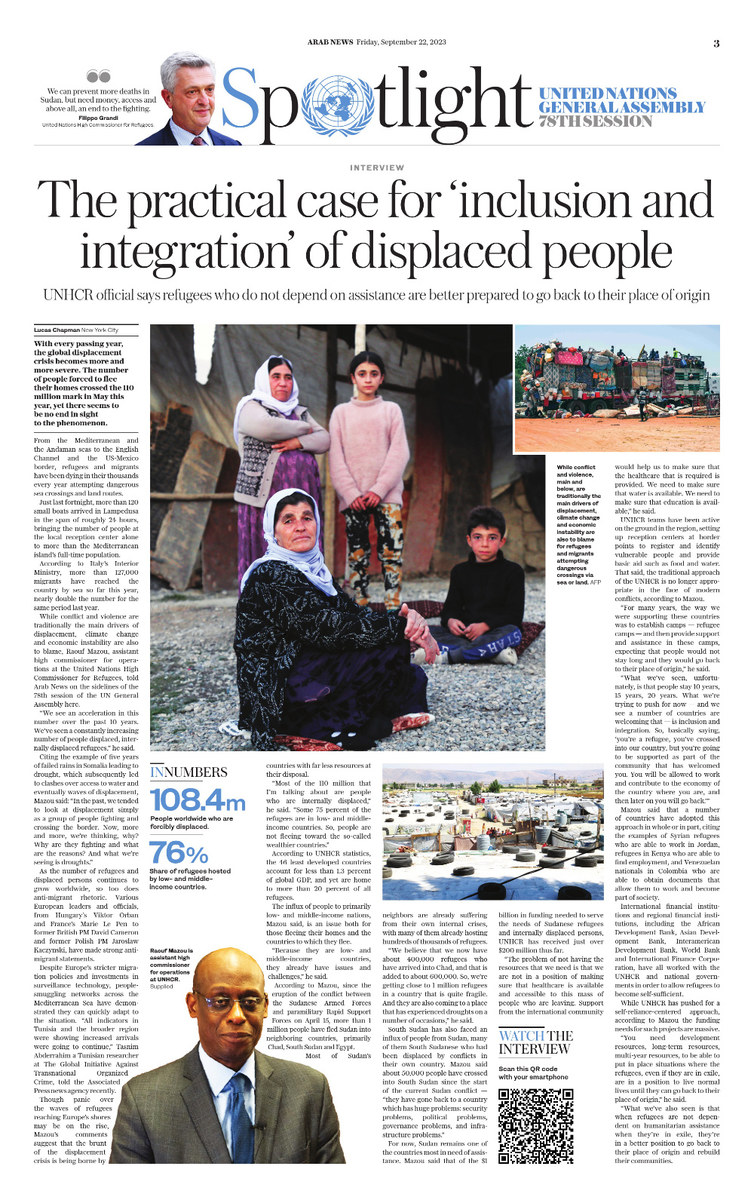NEW YORK: With every passing year, the global displacement crisis becomes more and more severe. The number of people forced to flee their homes crossed the 110 million mark in May this year, yet there seems to be no end in sight to the phenomenon.
From the Mediterranean and the Andaman seas to the English Channel and the US-Mexico border, refugees and migrants have been dying in their thousands every year attempting dangerous sea crossings and land routes.
Just last fortnight, more than 120 small boats arrived in Lampedusa in the span of roughly 24 hours, bringing the number of people at the local reception center alone to more than the Mediterranean island’s full-time population.
According to Italy’s Interior Ministry, more than 127,000 migrants have reached the country by sea so far this year, nearly double the number for the same period last year.
While conflict and violence are traditionally the main drivers of displacement, climate change and economic instability are also to blame, Raouf Mazou, assistant high commissioner for operations at the United Nations High Commissioner for Refugees, told Arab News on the sidelines of the 78th session of the UN General Assembly here.
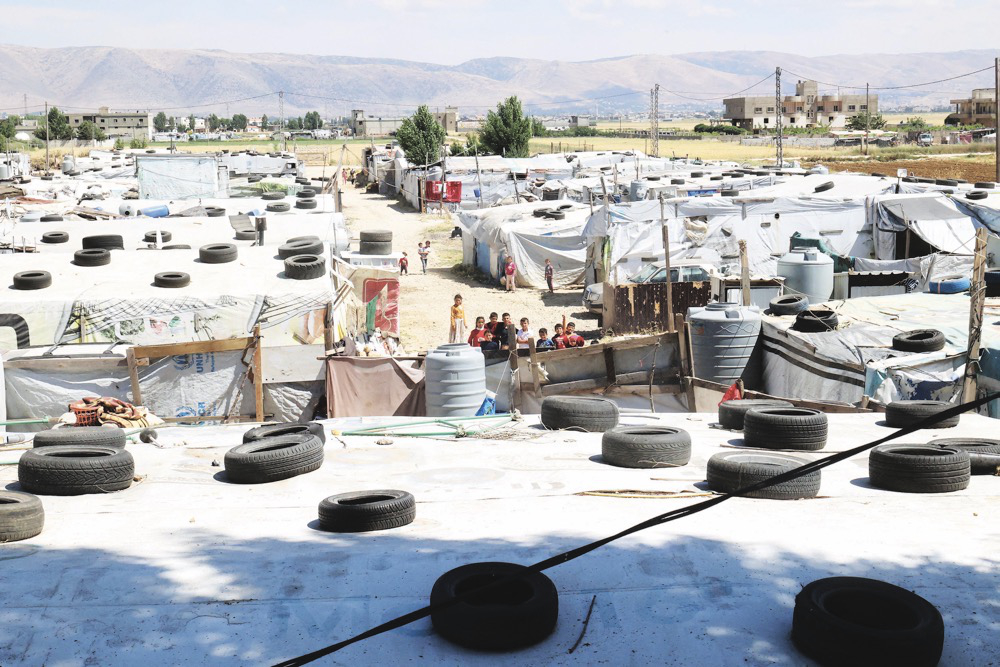
Syrian children gather at a refugee camp in Saadnayel in eastern Lebanon’s Bekaa Valley. (AFP)
“We see an acceleration in this number over the past 10 years. We’ve seen a constantly increasing number of people displaced, internally displaced refugees,” he said.
Citing the example of five years of failed rains in Somalia leading to drought, which subsequently led to clashes over access to water and eventually waves of displacement, Mazou said: “In the past, we tended to look at displacement simply as a group of people fighting and crossing the border. Now, more and more, we’re thinking, why? Why are they fighting and what are the reasons? And what we’re seeing is droughts.”
As the number of refugees and displaced persons continues to grow worldwide, so too does anti-migrant rhetoric. Various European leaders and officials, from Hungary’s Viktor Orban and France’s Marie Le Pen to former British PM David Cameron and former Polish PM Jaroslaw Kaczynski, have made strong anti-migrant statements.
Despite Europe’s stricter migration policies and investments in surveillance technology, people-smuggling networks across the Mediterranean Sea have demonstrated they can quickly adapt to the situation. “All indicators in Tunisia and the broader region were showing increased arrivals were going to continue,” Tasnim Abderrahim a Tunisian researcher at The Global Initiative Against Transnational Organized Crime, told the Associated Press news agency recently.
Though panic over the waves of refugees reaching Europe’s shores may be on the rise, Mazou’s comments suggest that the brunt of the displacement crisis is being borne by countries with far less resources at their disposal.
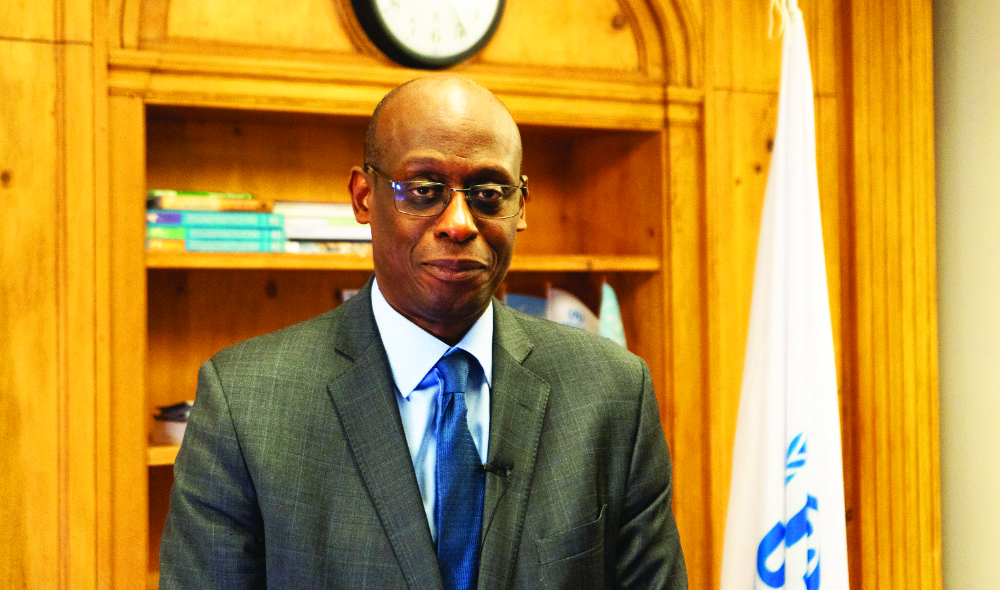
Raouf Mazou is assistant high commissioner for operations at UNHCR. (Supplied)
“Most of the 110 million that I’m talking about are people who are internally displaced,” he said. “Some 75 percent of the refugees are in low- and middle-income countries. So, people are not fleeing toward the so-called wealthier countries.”
According to UNHCR statistics, the 46 least developed countries account for less than 1.3 percent of global GDP, and yet are home to more than 20 percent of all refugees.
The influx of people to primarily low- and middle-income nations, Mazou said, is an issue both for those fleeing their homes and the countries to which they flee.
“Because they are low- and middle-income countries, they already have issues and challenges,” he said.
According to Mazou, since the eruption of the conflict between the Sudanese Armed Forces and paramilitary Rapid Support Forces on April 15, more than 1 million people have fled Sudan into neighboring countries, primarily Chad, South Sudan and Egypt.
INNUMBERS
• 108.4m People worldwide who are forcibly displaced.
• 76 percent Share of refugees hosted by low- and middle-income countries.
Most of Sudan’s neighbors are already suffering from their own internal crises, with many of them already hosting hundreds of thousands of refugees.
“We believe that we now have about 400,000 refugees who have arrived into Chad, and that is added to about 600,000. So, we’re getting close to 1 million refugees in a country that is quite fragile. And they are also coming to a place that has experienced droughts on a number of occasions,” he said.
South Sudan has also faced an influx of people from Sudan, many of them South Sudanese who had been displaced by conflicts in their own country. Mazou said about 50,000 people have crossed into South Sudan since the start of the current Sudan conflict — “they have gone back to a country which has huge problems: security problems, political problems, governance problems, and infrastructure problems.”
For now, Sudan remains one of the countries most in need of assistance. Mazou said that of the $1 billion in funding needed to serve the needs of Sudanese refugees and internally displaced persons, UNHCR has received just over $200 million thus far.
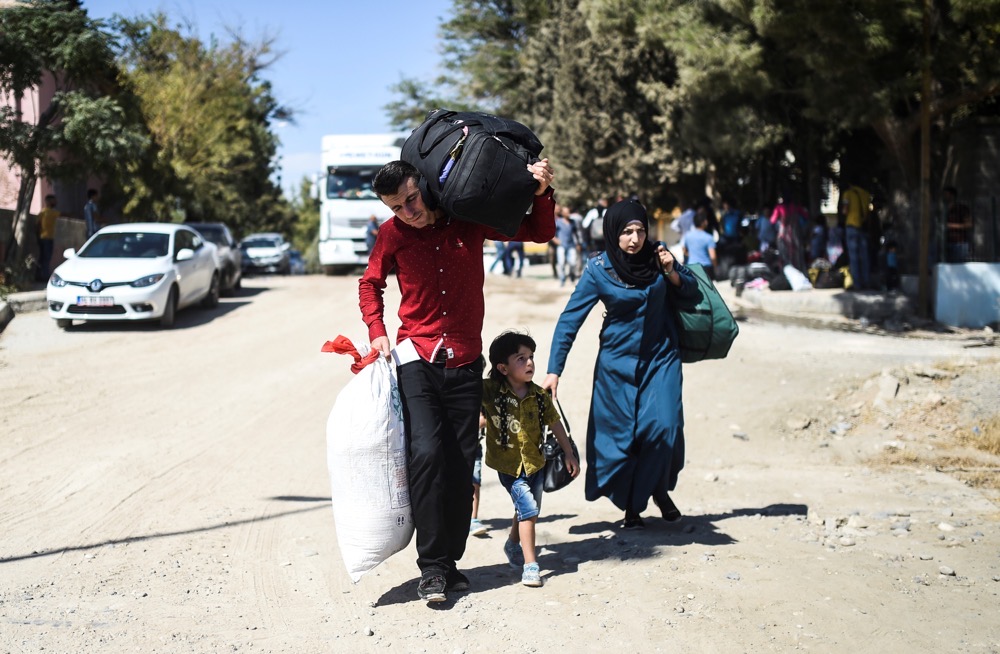
Syrian refugees walk on their way back to the Syrian city of Jarabulus. (AFP)
“The problem of not having the resources that we need is that we are not in a position of making sure that health care is available and accessible to this mass of people who are leaving. Support from the international community would help us to make sure that the health care that is required is provided. We need to make sure that water is available. We need to make sure that education is available,” he said.
UNHCR teams have been active on the ground in the region, setting up reception centers at border points to register and identify vulnerable people and provide basic aid such as food and water. That said, the traditional approach of the UNHCR is no longer appropriate in the face of modern conflicts, according to Mazou.
“For many years, the way we were supporting these countries was to establish camps — refugee camps — and then provide support and assistance in these camps, expecting that people would not stay long and they would go back to their place of origin,” he said.
“What we’ve seen, unfortunately, is that people stay 10 years, 15 years, 20 years. What we’re trying to push for now — and we see a number of countries are welcoming that — is inclusion and integration. So, basically saying, ‘you’re a refugee, you’ve crossed into our country, but you’re going to be supported as part of the community that has welcomed you. You will be allowed to work and contribute to the economy of the country where you are, and then later on you will go back.’”
Mazou said that a number of countries have adopted this approach in whole or in part, citing the examples of Syrian refugees who are able to work in Jordan, refugees in Kenya who are able to find employment, and Venezuelan nationals in Colombia who are able to obtain documents that allow them to work and become part of society.
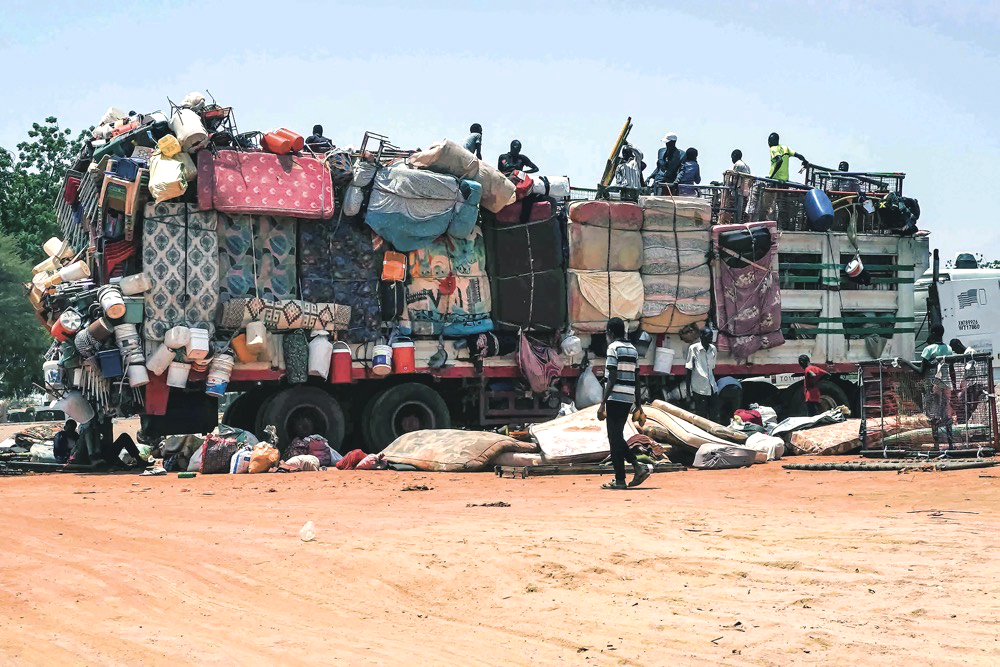
According to Mazou, more than 1 million people have fled Sudan as a result of the conflict. (AFP)
International financial institutions and regional financial institutions, including the African Development Bank, Asian Development Bank, Interamerican Development Bank, World Bank and International Finance Corporation, have all worked with the UNHCR and national governments in order to allow refugees to become self-sufficient.
While UNHCR has pushed for a self-reliance-centered approach, according to Mazou the funding needs for such projects are massive.
“You need development resources, long-term resources, multi-year resources, to be able to put in place situations where the refugees, even if they are in exile, are in a position to live normal lives until they can go back to their place of origin,” he said.
“What we’ve also seen is that when refugees are not dependent on humanitarian assistance when they’re in exile, they’re in a better position to go back to their place of origin and rebuild their communities.”
